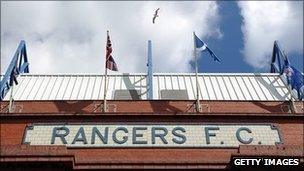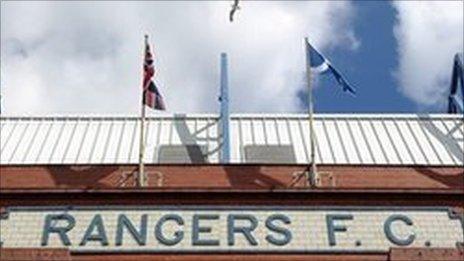Rangers' financial blues
- Published
- comments

Craig Whyte has tried to reassure sports reporters about Rangers' finances
It may be the beautiful game, but football's finances are looking ugly.
Accountants PKF underlined as much today, with their latest take on the game north and south of the border. Its survey found a lot of pessimism, delays in paying tax bills, too much debt, not enough TV income, falling gate takings and a struggle to secure sponsorship.
All this while first team squads are shrinking, yet player pay doesn't seem to be adjusting to the harsh realities of the downturn.
The survey is based on less than half the Scottish Premier League, so statistically, it has to be treated with a lot of care. But it's in line with much else we've been hearing about football finance.
We've been hearing a lot about one club in particular, as Craig Whyte discovers, as the new boss at Ibrox, that he's operating in a goldfish bowl - lots of people staring in, and some of the goldfish, it seems, given to eating their own kind.
Possible insolvency
A leaked version of the legal submission in an action against Rangers by its former chief executive Martin Bain is firmer evidence - if genuine - of much that has been rumoured.
And it includes reference to £49m of tax bill - that's £35m plus penalty - over which Rangers is still battling with HM Revenue and Customs.
The story continued yesterday with Craig Whyte gathering sports reporters to reassure them about Rangers' finances, and to tell them that Rangers will still be playing at Ibrox long after they're all dead.
It wasn't a claim he was willing to put on camera - a media strategy that makes you wonder what they've got to fear from a lens and a microphone.
This wasn't the most reassuring of messages, as reported today. Years of pain and cuts are ahead, and he couldn't make any guarantees about the club's future if it loses the larger of two tax disputes.
"I won't let club go bust," was one headline.
Don't be so sure, was the view of the Court of Session today. Martin Bain's lawyers successfully argued that the risk of insolvency at Ibrox is sufficiently high and imminent that money should be set aside pending the outcome of his legal action - not the £1.3m he is claiming, but £480,000.
That adds to the £2.3m which, it was claimed by Bain's counsel, is already frozen in pursuit of the smaller of HMRC's two tax claims.
But what about the £49m bill, if they lose the tax tribunal in November? There's still an expectation at Ibrox that Rangers can win that.
"If we don't, let's deal with that then," Whyte is quoted as saying yesterday. "There's no point in speculating about what may or may not happen".
Unfortunately for him, that speculation is exactly what many football fans are engaged in.
And I've been making some inquiries about the accounting and legal position Rangers is now in. So here are some of those hypotheticals:
Leaving aside the tax bills, could Rangers go under?
Could Craig Whyte benefit from collapsing the club?
What happens if Rangers loses its larger tax case?
Tax crackdown
So collapsing the company ahead of a ruling by the tax tribunal would not make the case go away. And if HMRC becomes the largest creditor, having won the tax dispute, then the tax authority is in the driving seat in determining who controls the club when it comes out of administration.
The administrator has a legal duty to try to rescue the business as a going concern and to sell it on, seeking compromise between creditors to get the best deal for all of them.
Those who fear Rangers would go the way of Gretna should be reassured by that. There is still a lot of value in the club, its ground, its brand and its following, but only if it continues to trade and to play football.
Other factors worth noting about HMRC's recent behaviour: it's begun to use a legal power that has been little used for years, which holds directors personally liable for tax, and particularly for national insurance, that's gone unpaid.
Could that extend to former directors? Apparently so. Watch out, Sir David Murray.
It's also keen to challenge the assertion by football's ruling bodies that football debts, such as player transfer fees, should take priority over all other bills. Unsurprisingly, HMRC begs to differ, seeing itself as first in the queue.
One final word of advice from m'learned friends: company administrations are best when they're planned, and the outcome determined in advance.
- Published13 September 2011

- Published13 September 2011
